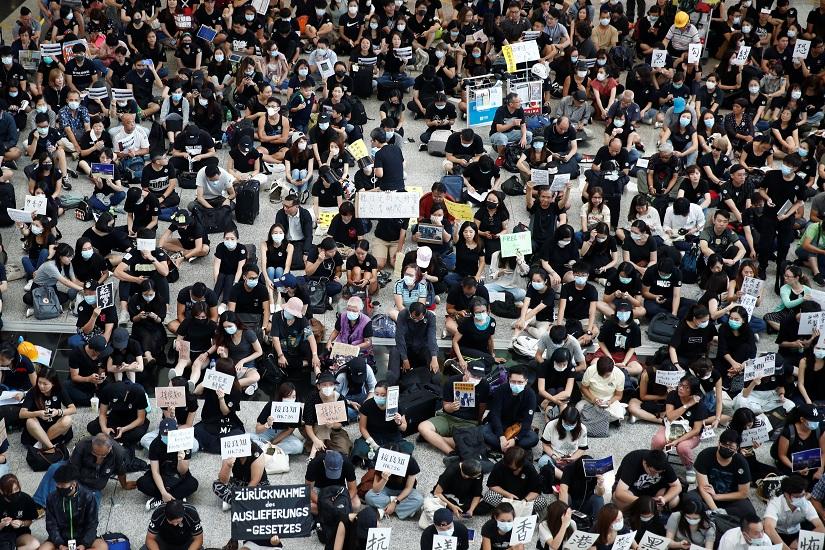 For a long period, the mere mention of Hong Kong conjured up three images: British domination of the island, unimaginable riches and of course, Bruce Lee.
For a long period, the mere mention of Hong Kong conjured up three images: British domination of the island, unimaginable riches and of course, Bruce Lee.
Interestingly, in the 70s and 80s, people in Bangladesh only knew about Hong Kong for the low budget martial arts movies. Of course, some of the films were terrific and still remain among the best films featuring Kung-Fu and Karate.
To come back to the present, Hong Kong is in the headlines for a very different reason – a massive public uprising against what can be called a stifling control by mainland China.
It’s the same old tale of the masses erupting against what they perceive to be an authoritarian rule.
Lest we forget: the spirit of revolution is inherent in humans and the desire to stand up against tyranny an ancient culture.
The question is, do such revolutions actually achieve anything in the end or not.
Take the Arab uprising as an example. Around eight years ago, the middle-east plus other Arab nations in North Africa were in turmoil as common people rose against what they believed to be totalitarian regimes.
Eight years down the line, the result of the revolution does not present not a rosy picture. In fact, sometimes the very notion of an uprising is based on utopian ideals with little relation to practicality.
When a revolution happens, the expectations are grand and the hopes often irrational.
The Arab world is still in turmoil – Libya and Iraq are in disarray with the vehement promoters of social uprisings forced to concede that sudden eruptions of pent up anger without a strategic plan only exacerbates a situation.
COMMUNISM WITH CAPITALIST PERKS LOSES ITS ALLURE
To understand the recent public furore in Hong Kong, one has to go back to the Tiananmen square student uprising in Beijing, 1989. While China crushed the student protest thirty years ago, it became evident that unless there are changes in the system, public revolutions would be triggered soon.
Thus came the Chinese model of Communism with the enticing upper layer of all the glitz of Capitalism. The pursuit of personal wealth, comfortable lifestyles and opulent living were encouraged. The rule was simple: do what you want, acquire what you wish but don’t go against the state or find faults with it too often.
The formula worked like a miracle because today’s China, which is arguably a global economic leviathan is but a by-product of the astute fusion of two ideologies.
Now this formula may work to almost perfection in mainland China but IS bound to struggle in Hong Kong because this island had been under full Capitalist system until 1997. Under Britain, Hong Kong was already flourishing as an Asian economic hub and far before China enforced ITS blended ideology, Hong Kong was a success through Capitalism alone where freedom of speech and other rights were not stifled.
So, does this mean Hong Kong was better under the Union Jack? By no means, the only reason the island had a booming economy is that the 70s and 80s saw Asian tigers emerge in the world market.
The problem is, prior to 1997, people in Hong Kong had enough public liberty which, reportedly, was being curtailed later under Chinese control.
There is, of course, another reason for the rebellious nature among young Hong Kong residents – they are the digital generation, with social media offering them the chance to voice their desires and aspirations freely.  GLAMOUR OF OPULENCE FAILS TO SWAY THE MASSES:
GLAMOUR OF OPULENCE FAILS TO SWAY THE MASSES:
There is a common notion that once people are given the chance to earn freely, live lavishly with all the perks plus creature comforts, they will be willing to accept certain restrictions.
This worked for a while but the protesters in Hong Kong are mainly the young, who are acutely aware of their right to speak out against anything that reeks of totalitarianism. They simply cannot be palmed off with enticing benefits of a Capitalist economy.
The stance taken by China so far has been rigid though it’s apparent that even if the current wave of protests die out, the seeds of resentment will remain.
The bottom line is, there has to be some concessions made to appease the people.
Coming back to the social uprisings, no revolution in the world paved the way for total bliss. In fact, the periods after successful public uprisings have always been marred by bloodshed, anarchy, disorder and economic implosion.
So, taking A lesson from the past, even if the young in Hong Kong manages to bring the authority to its knees, the aftermath may not be that smooth, simply because the administration will retain its distrust of the masses.
In such conditions, where the state is at war with its people, no side will ever have their way. Notice, I did not mention the word ‘victory’ because in a country where state and the people are at odds, there cannot be a victory because if one side’s beliefs are totally imposed on the other, there will be simmering anger and since both sides are of the same country, it’s the nation that will lose in the end.
IN SHORT: THIS CONFLICT HAS NO WINNER!
From the current state of affairs, neither the state nor the public are willing to act reasonably which only tarnishes the image of the mainland and Hong Kong.
To end in the line of martial arts movies: the ‘Way of the Dragon’ should not be imposed arbitrarily. The Chinese ‘Fist of Fury’ needs to be contained and a conciliatory approach taken.
Maybe it’s time Chinese Communism underwent another bout of reforms!
 Opinion
Opinion
30745 hour(s) 58 minute(s) ago ;
Evening 08:53 ; Friday ; Apr 19, 2024
Shadow of the dragon over Hong Kong!
Send
Towheed Feroze
Published : 17:24, Aug 14, 2019 | Updated : 19:16, Aug 14, 2019
Published : 17:24, Aug 14, 2019 | Updated : 19:16, Aug 14, 2019
0 ...0 ...
/ab/hb/
Topics: Top Stories
***The opinions, beliefs and viewpoints expressed in this article are those of the author and do not reflect the opinions and views of Bangla Tribune.
- KOICA donates medical supplies to BSMMU
- 5 more flights to take back British nationals to London
- Covid19: Rajarbagh, Mohammadpur worst affected
- Momen joins UN solidarity song over COVID-19 combat
- Covid-19: OIC to hold special meeting
- WFP begins food distribution in Cox’s Bazar
- WFP begins food distribution in Cox’s Bazar
- 290 return home to Australia
- Third charter flight for US citizens to return home
- Dhaka proposes to postpone D8 Summit
Unauthorized use of news, image, information, etc published by Bangla Tribune is punishable by copyright law. Appropriate legal steps will be taken by the management against any person or body that infringes those laws.
Bangla Tribune is one of the most revered online newspapers in Bangladesh, due to its reputation of neutral coverage and incisive analysis.
F R Tower, 8/C Panthapath, Shukrabad, Dhaka-1207 | Phone: 58151324; 58151326, Fax: 58151329 | Mob: 01730794527, 01730794528


